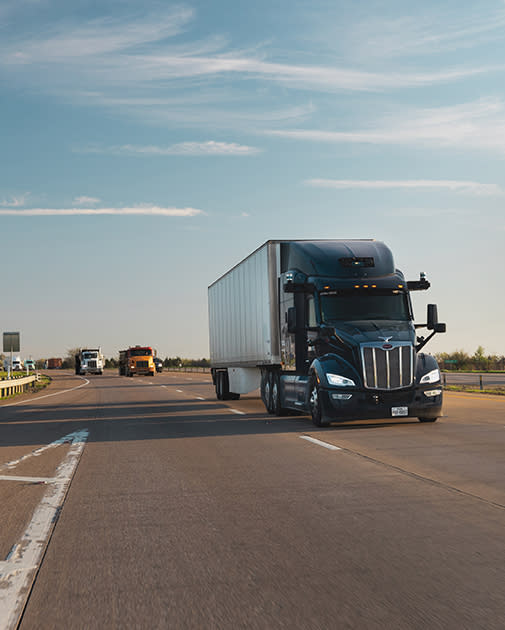Autonomous freight trucks are slated to hit the Dallas highways this month. The self-driving heavy-duty semi-trucks running on technology formulated by Aurora, a Pittsburgh-based self-driving vehicle tech company, will roll back and forth along the Interstate 45 corridor connecting Dallas and Houston. This busy stretch of freeway will be the launch site for Aurora’s fleet of self-driving trucks, with an additional route between Fort Worth and El Paso, already planned.
“Opening a driverless trucking lane flanked by commercially-ready terminals is an industry-first that unlocks our ability to launch our driverless trucking product,” said Sterling Anderson, co-founder and chief product officer of Aurora in a 2023 press release announcing local Aurora terminals were ready for driverless operations. “With this corridor’s launch, we’ve defined, refined, and validated the framework for the expansion of our network with the largest partner ecosystem in the autonomous trucking industry.”
In a March shareholder letter, Aurora outlined its progressive plan for trucks on the highway, calling it a “crawl, walk, run approach.”
“During launch, we expect to deploy up to 10 driverless trucks in commercial operations, starting with one driverless truck and then transitioning the balance to driverless operation,” reads the letter.
According to a report from the National Transportation Research Group, Texas moved more freight than any other state in 2022, about 3.4 billion tons valued at $3.1 trillion. More than half of all truck freight that moves through Texas takes the strip of I-45 that Aurora’s trucks will navigate.
Aurora is partnered with several vehicle manufacturers, including the Denton-based Peterbilt, installing their software and hardware on pre-built trucks, enabling self-driving features. The tech company is also partnered with freight companies like FedEx and Uber Freight. Aurora’s self-driving tech, named Aurora Driver, includes a mix of radar, light detection and a series of cameras, removing the need for human intervention.
“We are on the cusp of a new era in transportation,” reads a press release from Aurora’s head of government relations, Gerardo Interiano. “Autonomous vehicles are no longer just a concept — they are being deployed in trucking, passenger mobility, agriculture, and mining, paving the way for a safer, more efficient future. Aurora’s plans to deploy self-driving trucks onto public roads in Texas will bring the benefits of autonomy directly to our supply chain and economy.”
See here for the previous update, which in January of 2024 promised we’d have these autonomous trucks with no human backup drivers on the road by the end of that year. The timing slipped a little, but here we are. There was a long story in the business section of the Thursday print edition that went into a lot of detail about this, but for some annoying reason it’s not on the Chron site or visible in Google news. We do have this Chron story from March 31 that gave a bit of a preview.
Aurora, a developer of self-driving vehicles, has released its report during its final preparations to launch self-driving trucks without a safety driver on Texas highways.
The Driverless Safety Report includes information on safety engineering, cybersecurity and risk management, according to Aurora in the news release. The report is an expanded version of the Voluntary Safety Self-Assessment — documents encouraged by the National Highway Traffic Safety Administration for companies who develop and launch automated driving systems.
“Our safety approach spans both product and organization, and in this report, we’ve shared a behind-the-scenes look into our safety systems,” said Nat Beuse, chief safety officer at Aurora, in a statement.
The NHTSA has a voluntary safety guidance document that notes 12 elements, including system safety, object and event detection and response, human-machine interface, crashworthiness, and compliance with federal, state and local laws.
When the NHTSA becomes aware of a new assessment publication, it’s added to the Voluntary Safety Self-Assessment index online and made available to the public.
Aurora has been partnering with FedEx, Uber Freight, Hirshbach and Schneider for its self-driving system, the Aurora Driver, on the Dallas to Houston route. The company has not yet announced who will be a part of the fleet for the driverless operations, according to Jake Martin, spokesperson for Aurora.
Aurora officials will also have to close its safety case framework before the launch.
Amy Witherite, founder of the Witherite Law Group and a traffic safety expert in Texas, said that although she applauds Aurora’s efforts, she is still concerned about the report’s lack of specific details about how often or under what circumstances the company’s automation had failed or required human intervention.
“With literally billions of dollars at stake, it is fair to ask whether companies who will potentially profit from this technology should be the ones who decide whether it is safe to put on our highways,” she said in a statement.
Martin said in an email that Aurora submits safety incidents to the NHTSA and the company doesn’t publish them independently.
The company plans to have full driverless operations on Texas highways in April. The trucks were traveling with a safety driver present to monitor the self-driving system’s performance. Aurora’s full report can be read online.
I figure there will be more coverage once the trucks are actually on the road. KVUE has a video story if that interests you. These trucks with the safety drivers have been on the road since 2021 with a sufficiently good track record that you probably weren’t aware of their presence on I-45. According to that so-far-print-only Chron story, the safety drivers have rarely had to intervene, and most of the time that they did they were being more cautious than was necessary. The basic idea here is that while this will reduce the need for long-haul truckers, for which there’s a shortage, it will open up opportunities for short-haul drivers. We’ll see how this goes.


Pingback: Voices, The Peoples News No. 2025-04-23 – MPEN